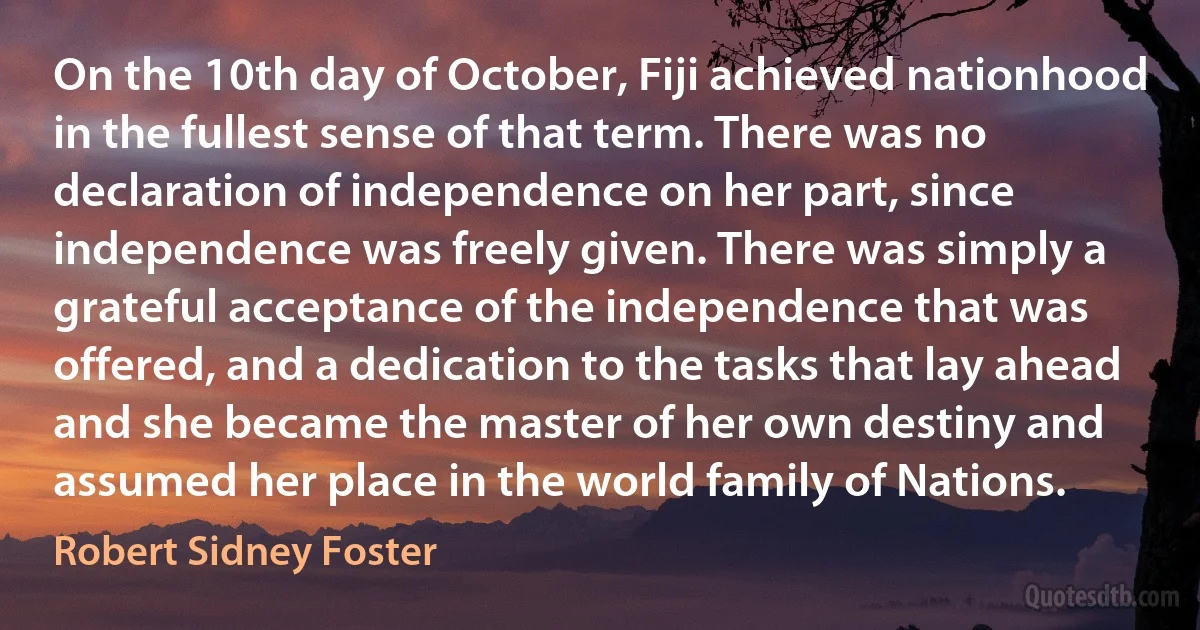Lay Quotes - page 84
This was the problem: if what had to be discovered lay in the what-was-to-be, then they could discover that easily enough. It was what-had-been that was hard to keep in mind. That's the way it is for beings who are immortal or nearly so; they know the future, but the past is dark to them; beyond the present year is the door into aeons-ago.

John Crowley
Prosper's earliest memory was of hearing the enormous Hoover starting up somewhere in the house, brand-new then possibly, anyway unknown to him, an inexplicable noise at once a roar and shriek and coming closer; moving away; closer again, and evidently seeking him out where he lay in bed. Then to find the great gray floor-sucker thing entering his room, manipulated by his grim-faced mother, therefore not dangerous at all, maybe.

John Crowley
The dilemma of traditional sex research lay in the unconscious, but unquestioningly assumed division into opposing drives and hereditary factors... The division into heterosexuality and homosexuality, into heterosexuals and homosexuals, is also an artifact that rests on a grave error, namely, on the assumption that a fundamentally different model is necessary to explain heterosexual and homosexual behavior. The entire investigation of etiology was ideologically loaded beforehand because it separated a segment of the sexual continuum and attempted to make analyses with the help of fundamentally different concepts.

Rolf Gindorf
Irish generosity extended not only to a variety of people but to a variety of ideas. ...they brought into their libraries everything they could lay their hands on. ...Not for them the scruples of Saint Jerome... they began to devour all of the old Greek and Latin pagan literature that came their way.

Thomas Cahill
The Greeks were the classicists of antiquity, and they are still today the preeminent classicists. What marked all they did, the classic stamp, is a direct simplicity in expressing the significance of actual life. It was there the Greek artists and poets found what they wanted. The unfamiliar and the extraordinary were on the whole repellent to them, and they detested every form of exaggeration. Their desire was to express truthfully what lay at hand, which they saw as beautiful and full of meaning. But that was not the Roman way. When not directly under Greek guidance, the Roman did not perceive beauty in every-day matters, or indeed care to do so. Beauty was unimportant to him. Life in his eyes was a very serious and a very arduous business, and he had no time for what he would have thought of as a mere decoration of it.

Edith Hamilton
From the multitude of books published on the subject of cultivating the earth, one would have imagined the art to have been more studied, than it really has been; since upon the whole it continued in. a sort of declining condition from the days of Virgil and Columella, till the time of Constantine IV. and then lay in a kind of dormant state till about the middle of Henry VIIIth's reign, when it was rather revived,, than improved.
Indeed, about that time, Judge Fitzherbert, in England (better known among us, as author of another/ excellent work, called Natura Brevium) Tatti, Stefano, Agostino Gallo, Sansovino, Lauro, Tarello, &c. in Italy, published several considerable books in Agriculture; but our countryman was the first, if we except Crescenzio dell' Agricoltura, (whose fine performance was printed at Florence in 1478) and Pier Marino the translator of Palladius de Re Rustica, who made his work public in the year 1528.

Walter Harte
To the old Union they had said that the Federal power had no authority to interfere with slavery issues in a state. To their new nation they would declare that the state had no power to interfere with a federal protection of slavery. Of all the many testimonials to the fact that slavery, and not states rights, really lay at the heart of their movement, this was the most eloquent of all.

William C. Davis (historian)
And shall they rise, all these? Will there be a trumpet blast so shrill that none of them may refuse to hear it, and the soul, re-entering its shrine of eminent or common clay, pass upward to the judgment? "Many and mighty, but all hushed," shall they submit with us to the judgment of the last assize? And in that world is it true that gold is not the currency, and that rank is not hereditary, and that there is only one name that is honored? Then, if this is the end of all men, let the living lay it to heart. Solemn and thoughtful, let us search for an assured refuge; childlike and earnest, let us conf1de in the one accepted Name; let us realize the tender and infinite nearness of God our Father, through Jesus our Surety and our Friend.

William Morley Punshon
When we all got back to camp, our General communicated by heliograph through a distant mountain top with Sir valley and lay it waste with fire and sword in vengeance. This accordingly we did, but with great precautions. We proceeded systematically, village by village, and we destroyed the houses, filled up the wells, blew down the towers, cut down the great shady trees, burned the crops and broke the reservoirs in punitive devastation. So long as the villages were in the plain, this was quite easy. The tribesmen sat on the mountains and sullen watched the destruction of their homes and means of livelihood. When however we had to attack the villas on the sides of the mountains they resisted fiercely, and we lost for every village two or three British officers and fifteen or twenty native soldiers. Whether it was worth it, I cannot tell. At any rate, at the end of a fortnight the valley was a desert, and honour was satisfied.

Winston Churchill
Sighing, he became aware of his own insignificance in the midst of this infinite chorus glory and radiance; his whole consciousness dissolved into one sacred, tearful yearning to be allowed to be one with the Highest and be no longer any part of himself. He lay for a long time on the sand or on the grass, and wept tears of deep and fervent happiness, face to face with the inexpressible. "God, God, God!" he cried, trembling with love and reverence, and kissed the ground and dug his fingers into the turf.

Halldór Laxness
O man, no matter what you have studied or how much you have studied, do not follow the ways of your mind with conceit in your learning. Ask a man of wisdom who is on the path and follow his directions. If you do not meet a man of wisdom, lay your heart open and ask even a tree or a wall. The power of God within your heart called conscience will caution you and guide you. It will say, "Go," or "Don't go," "Right," or "Wrong." If your heart is open, your conscience will provide useful fruit which will benefit your journey through life.

Bawa Muhaiyaddeen
Oh! what waves of crime and bloodshed have swept like the waves of a deluge down the valley of the Rhine! War has laid his mailed hand on those desolate towers and ruthlessly torn down what time has spared, yet he could not mar the beauty of the shore, nor could Time himself hurl down the mountains that guard it.

Bayard Taylor
Here everything is dark. A series of storms has destroyed all our hopes which were full of promise. A plentiful hay harvest drowned and the finest wheat the farmers have had for years all laid. It is a scene of ravage, of havoc like a conquered country. It is the last drop in the bitter cup which the landed interest will have to swallow. ... As for politics, Gladstone will be as fatal to the aristocracy as the weather; and if he were younger the Crown would not be safe.

Benjamin Disraeli



